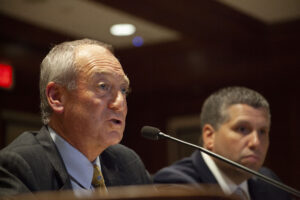
Metro Credit Union President Robert Cashman said a bill filed by Sen. Sal DiDomenico would allow him to better serve his members by giving loans for real estate outside the credit union's immediate geographic area. Photo by Chris Lisinski | State House News Service
Credit unions and banks, long at odds over the differing regulations they face, renewed sparring Wednesday over several bills that industry leaders on either side claim gives the other an unfair advantage.
A range of legislation is pending before the Joint Committee on Financial Services that would implement changes to how credit unions operate, such as a new prohibition on deposits from non-authorized patrons or permission to offer real estate loans outside their geographic area.
Those proposals fueled the latest round of disagreement between the two prongs of the financial services industry, with executives from several credit unions and members of the Massachusetts Bankers Association both testifying at the committee’s hearing.
They highlighted different details they view as concern, but reached similar conclusions: that the language in question would boost one side at the other’s expense.
One bill (H.1065), filed by Rep. Frank Moran, drew sharply differing reviews. It would bar credit unions from taking deposits from most non-members and from making some large business loans, and it would also require credit unions that seek to change the bylaws governing their membership to secure votes only at annual meetings rather than special meetings, which can be scheduled more promptly.
The Massachusetts Bankers Association has been working on the legislation for several sessions, and John Skarin, the organization’s executive vice president, said the latest refined version is a viable compromise.
“This bill, we think, strikes a balance between some of the overreaching provisions we had in the original bill and some things this committee might find favorable this session,” Skarin said.
Credit union executives disagreed, slamming the proposal as a clear effort by the banking industry to hamstring competitors.
“This bill is a simple attempt to publicly discredit local credit unions, increase the regulatory burden, and claim an even larger share of the marketplace for banks,” said Ron McLean, president and CEO of the Cooperative Credit Union Association.
Tensions also flared over other bills backed by credit unions. One proposal (S.575 / H.1034) would close regulatory gaps amid a changing landscape and allow mutual banks and credit unions to merge – with the charter remaining in the name of the union – as a way to manage pressure from larger national and international banks.
The bill would further expand credit unions’ ability to purchase or participate in loans, something that industry leaders say is currently difficult to do.
“The industry is changing very rapidly,” said Robert Cashman, president of Metro Credit Union, during the hearing. “In essence, what this would do is strengthen the credit union charter.”
That, too, drew protests from bankers. Ian Hecker, a Middlesex Savings Bank executive vice president and MBA member, opposed the bill, arguing it would “make an already difficult situation even worse by expanding credit union powers.”
“It seems very clear that the credit union industry is asking to be treated like a bank, but remain tax-exempt and under-regulated,” Hecker said. “It’s difficult to see how promotion of tax-exempt but obviously commercial business activity would make for sound public policy.”
Last session, the Financial Services Committee favorably reported a streamlined version of legislation before it again (S.581 / H.1060), but the matter never cleared the Senate Ways and Means Committee.
This time around, the committee’s House chair, Rep. James Murphy of Weymouth, stressed that members want to avoid choosing one side over the other. Instead, he said, representatives from the two industries should communicate over compromises.
“We’re not looking to jam anything down anybody’s throat,” he said. “We would like to help both industries, both banking and credit unions, modernize things that allows you to work more efficiently.”






